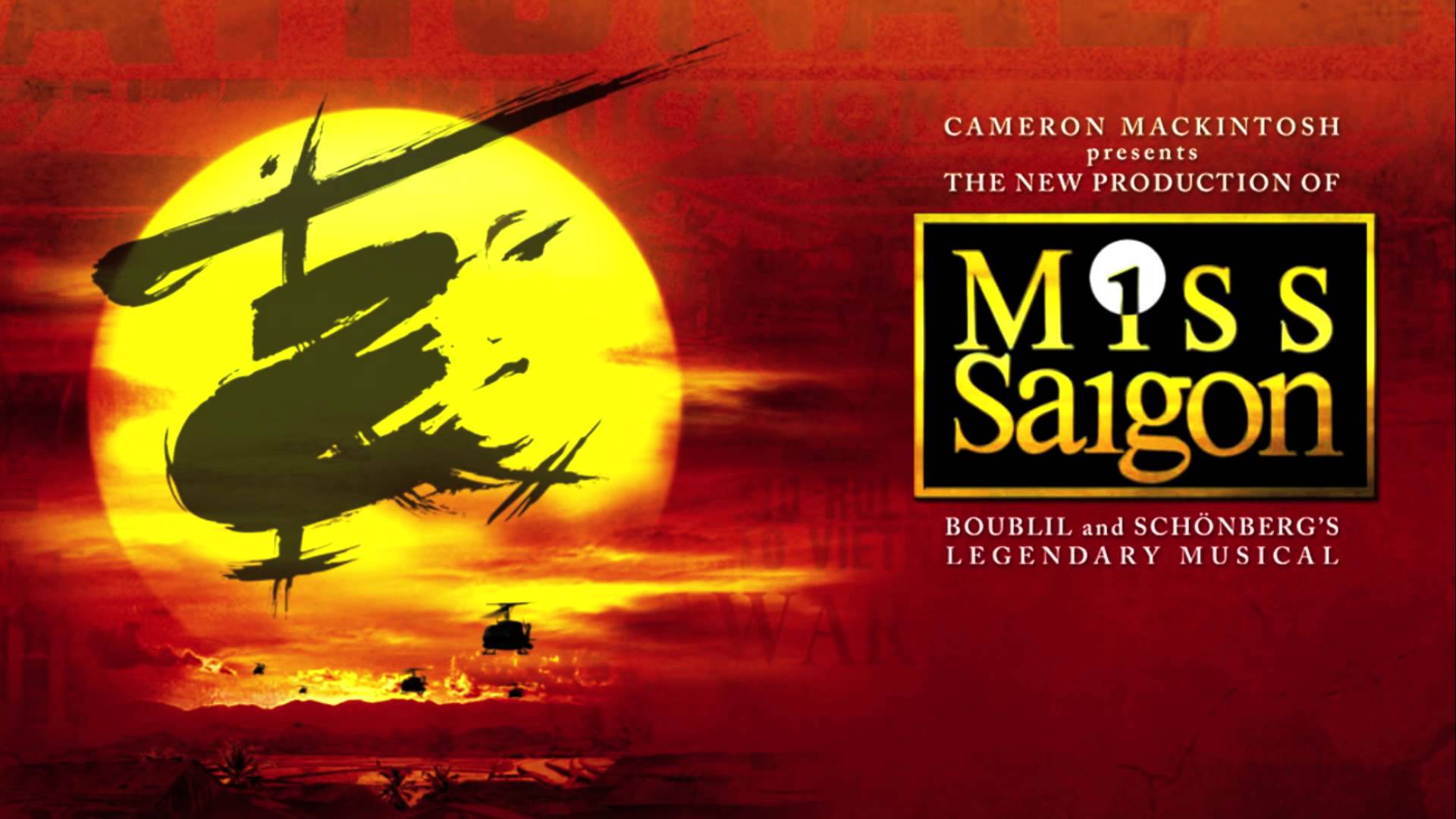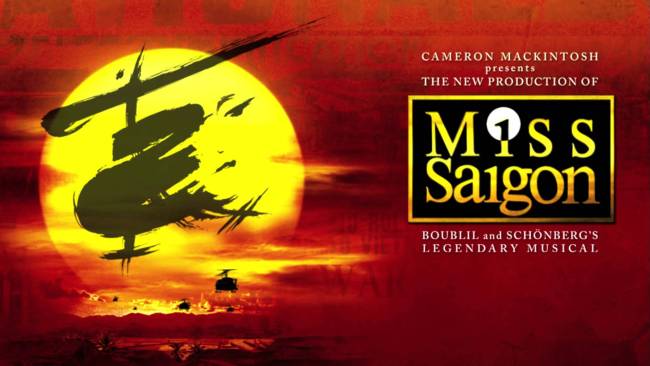My Heat With Miss Saigon


The Vietnam War ended in 1975 when the communist North Vietnamese captured Saigon, the capital city of the democratic south. Amidst the evacuation, thousands of photographs immortalized the chaos, confusion, and heartbreak of those last few days in April. One of them, in which a mother gives up her daughter so she can live with her American G.I. father, left record producer Claude-Michel Schönberg “appalled.” In 2000, Schönberg wrote: “I had to sit down and catch my breath … I suffered for the mother as though I might see my own little boy leaving me forever.” To Schönberg and collaborator Alain Boublil, this picture of “The Ultimate Sacrifice” created Miss Saigon, one of the most successful musicals and the 13th longest-running Broadway show in history. After a 16 year absence, the show has returned to New York City. But in 2017, just what kind of show is Miss Saigon?
Let’s get this part out of the way: it’s still a blockbuster. Last month, I spent Mother’s Day with my mother and sister watching the triumphant, bombastic revival of Miss Saigon. It’s clear its producers spared no expense, with talent like the top-notch Eva Noblezada as Kim and Jon Jon Briones, a West End OG whose show-stopping, scene-chewing presence as the conniving Engineer overshadows Jonathan Pryce’s whitewashing. Miss Saigon is still a worthy matinee or evening out, with the climactic helicopter scene (the end of “Kim’s Nightmare”) still a spectacle to behold. It’s wham-bam Broadway at its best, without needless risks like someone breaking their necks. (Remember Spider-Man: Turn Off the Dark?)
But while the show is still worth what patrons will pay for, I found it hard to reckon with the show’s well-meaning sentiment of love underneath its gaudy, seedy settings of southeast sex trafficking and the chest-bumping of western imperialism. More importantly, I’m at a loss with what to make of the utter devotion to this thing that’s afforded by my sister and mother. My family isn’t Vietnamese and we didn’t live through that part of history, but we are Filipino-Americans who love theater—this part will matter when I get to the significance of the original Miss Saigon star.
I also know there’s a real, honest-to-goodness story about love transcending boundaries and the strength of motherhood. But is it worth the catchy numbers that glorify colonial kinks (“The Heat is On in Saigon”), which were written by two white dudes (Schönberg is French, Boublil is Tunisian) that pander to a western perspective to history? In short, how much heat should I give Miss Saigon?
AMERICANS
The heat is on in Saigon
The girls are ready to screw
One of these slits here will be Miss Saigon
And since we’re stuck here in hell, what’s a soldier to do
The stink is making me choke
Turns out this war is a joke
Turns out the joke is on you
GIGI
If I’m your pin-up, I’ll melt all your brass
Stuck on your ball, with a pin in my ass
If you get me, you will travel first class
I’ll show you, we will make magic, cheri
ENGINEER
You buy more tickets from me
The winner gets her for free
-“The Heat is On in Saigon”
It was the original Broadway run in the ‘90s where my sister fell in love with the show. Since it starred Filipina sensation Lea Salonga, it’s not hard to see why my sibling—who grew up wanting to become an actress and perform as Kim but has since given up this dream—connected to it more than anything else at the time. Put another way, this is a small sampling of the other top-grossing Broadway musicals in 1994: The Phantom of the Opera, Les Miserables, Beauty and the Beast, Cats, Damn Yankees, Carousel, and Sunset Boulevard. Felines aside, most of these shows held at the epicenter of all culture featured white actors in very white stories. So in comes Miss Saigon, with its star telegraphing to my sister that maybe she can be a star too.
My mother also found echoes within Kim, who at the end of Act I reveals her son Tam. During our matinee, I saw tears in her eyes during “I’d Give My Life For You,” a dark ballad Kim sings to Tam following her darkest moment in the show (besides the climax—Miss Saigon piles on misery like a Cormac McCarthy novel). In the still-blinding white arena that is Broadway, Miss Saigon is a rare opportunity for Asian performers. But does it matter that those available roles reinforce colonial fetishes, or in the case of the possessive Thuy, sinister antagonists? This, as you may see, bears a striking resemblance to the continuing challenges of Asian-Americans in cinema even today.
In the wake of Wonder Woman, I’ve been re-evaluating what “representation” means. Before I watched Diana of Themyscira rise from the trenches, I thought I had it figured out. I believed in my own authority when I argued for diversity in pop culture. Don’t make us stereotypes, and only writers and directors of color may critique our own. And really, so long as the token character wasn’t a walking, talking stereotype, I was chill; I think of John Cho in American Pie, where he coined “MILF.”
But then Patty Jenkins’s Wonder Woman smashed the box office, smashed expectations, and smashed everything I thought I knew. I’m a cisgender male, but as I got choked up watching Diana’s heroics born out of her love for mankind, the revelation hit me hard. That’s what this is supposed to feel like, I thought. Two months ago I relished Ludi Lin in his turn as his Asian-American boytoy Zack in Power Rangers, but that movie wasn’t his to own. Wonder Woman was all Diana and her shameless embrace of her identity. I almost felt that. I almost could identify. I wish I knew how that felt completely. And somehow, I know my sister feels that way about Miss Saigon.
I know at least I’m not alone in feeling somewhat alienated about Miss Saigon. Even during the show’s initial debut, there were protests over the show by a vocal Asian-American community. Everyone had their opinion. And while the red light districts of southeast Asia were—and still are—present and full of very complex people, American pop culture renders them a joke (Full Metal Jacket) or, like in Miss Saigon, a maze to find the diamond virgin in the rough.
KIM
I’m seventeen, and I’m new here today
The village I come from seems so far away
All of these girls know much more what to say
But I know
I’m so much more than you see
A million dreams are in me
CHRIS
Good Jesus, John, who is she?
-“The Heat is On in Saigon”
On the surface, there’s little in common between a superhero movie in a “cinematic universe” and a Broadway show—aside from the millions of dollars both have accrued. But one movie has and will inspire a generation of people, while the other inspired somebody I grew up with and love. Her Wonder Woman wasn’t an Amazonian princess, but an underage Vietnamese prostitute who falls for an American G.I. I don’t know if that’s a good or bad thing, and I don’t even think it’s my call to make. When the show ended and we left the theater for dinner, I asked my sister honestly about her thoughts regarding the show’s content. Her answer was the same as it was years ago: She likes the music, and she knows she could perform it.* Maybe that’s good enough.
*And she has, many times—in our living room. Being eight years younger, I was small enough to “play” Tam for her when she was in the mood to sing it the house. I had no choice.
Eric Francisco is a journalism graduate of Rutgers University. A lifelong Jersey boy, his origin story is too long to explain, but it involves a Sega Genesis and an internship at NBC. He began writing for Geekscape and is now a staff writer for Inverse, but if you ask him, he’d say he still wants to be a Power Ranger.
Want more stories like this? Become a subscriber and support the site!
—The Mary Sue has a strict comment policy that forbids, but is not limited to, personal insults toward anyone, hate speech, and trolling.—
Have a tip we should know? [email protected]